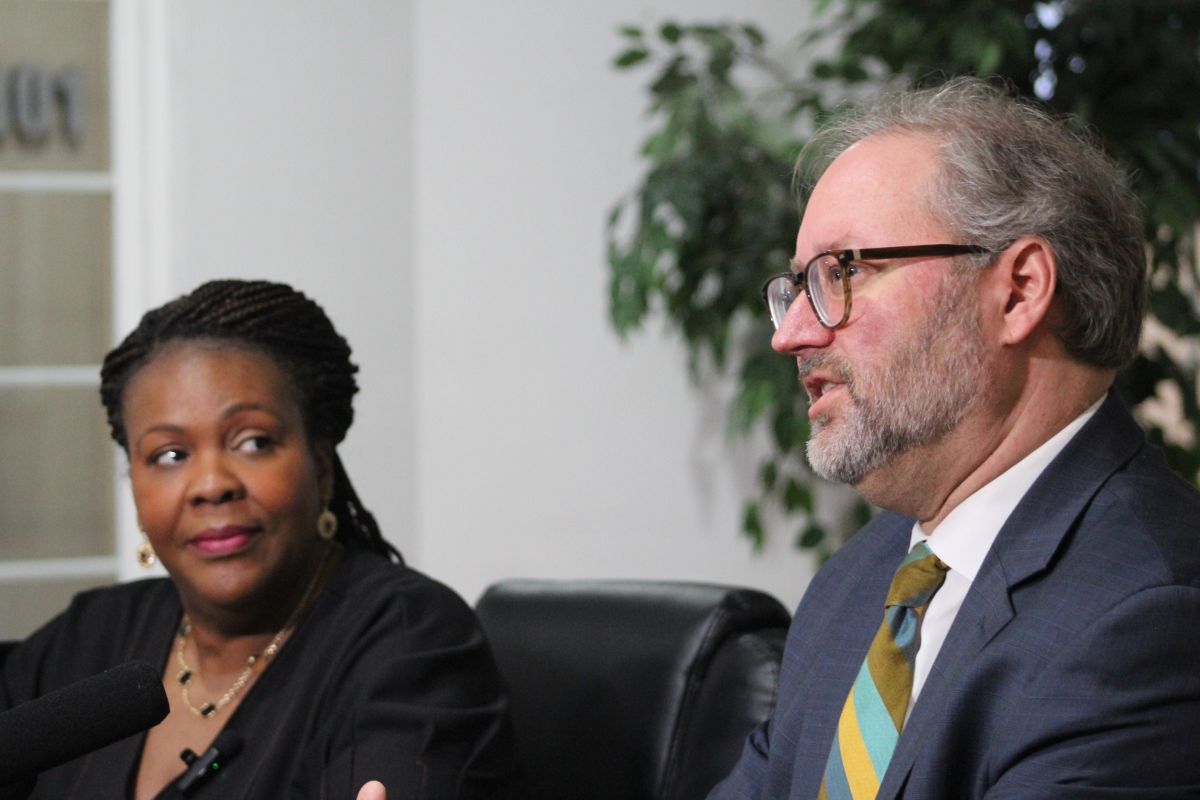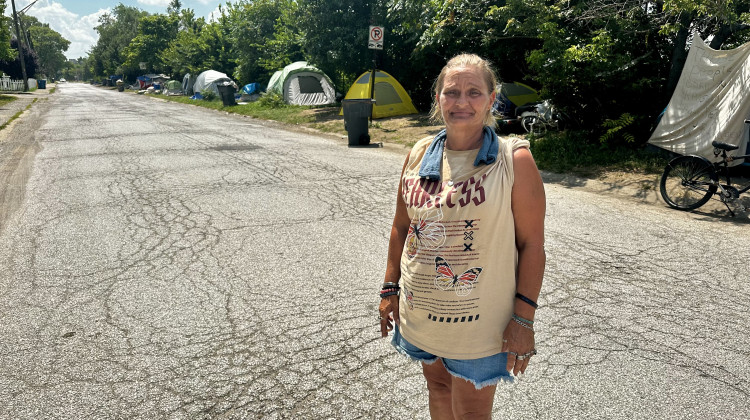The 2023 Indianapolis mayoral primary is the busiest in recent history. The contest is packed with a diverse lineup of candidates – an incumbent, a state lawmaker, a journalist, a pastor.
Ten people — six Democrats and four Republicans — filed to run for the office this year, double the number of contenders from the 2019 municipal elections. University of Indianapolis political professor Laura Merrifield Wilson said the larger pool offers voters more candidate quantity and quality.
“I think you're also talking about a real difference in vision for the city – a difference in perspective of where we are right now, and really a difference in terms of what each candidate sees as being critical for the future of Indianapolis,” she said.
A range of candidates after the end of slating
The Democratic ballot for the mayor’s office looks different this year, after calls for more inclusion in the party. Last year mayoral candidate and State Rep. Robin Shackleford, along with other state Democrats, spoke out about the establishment of the Marion County Democrat party. They also targeted the practice of slating, in which party-backed candidates are the only choice for voters. Marion County Democrats ended slating.
Community activist Clif Marsiglio said he was impacted by slating when he ran for a Statehouse seat. He said in the past, he tried to make change “within the system.”
“And I've realized at every single turn – the people that should be helping me are the ones that are hindering me, that are stopping me,” Marsiglio said. “The people that I voted for – the ones that I thought should be the ones that care – simply don't. They're here for their own ego, and they're not here to help anyone. And it just kind of bothered me. And so I said – you know what, if I don't do this, who will?”
“And then – everyone else did,” he added.
The group of Democratic candidates has thinned as candidates have withdrawn and thrown their support behind Shackleford. Greg Merriweather, a consultant who formerly worked for the city, bowed out of the race in March.
At a press conference last week, Marsiglio also stepped down. He said fixing issues with infrastructure, public safety, and public health is a priority he and Shackleford share.

“We see the streets up close. We see how bad it is. We see how people are dying on the streets,” Marsiglio said. “I focus on substance abuse issues. We shouldn't be criminalizing substance abuse within the city. We are focusing on things such as policing and mental health issues.”
Shackleford, who has been a state lawmaker for the past decade, said the fact that two of her peers would step aside to support her is telling.
“It sends a clear message that we all want to see change, and that we're willing to unify behind the best candidate so we can see that change,” she said.
Shackleford says the move to end slating is about improved inclusion and accessibility.
“We needed to start building our bench with people with new ideas, better ideas. And the only way we was going to get to that point was to keep the party out of these races until there is a clear candidate, and to let everybody be able to run,” Shackleford said.
Shackleford is incumbent Joe Hogsett’s most serious competition. Her candidacy will test the status quo, and could reveal whether Marion County voters are ready for a shift in leadership.
Hogsett says he welcomes the competition and supports the end of slating.
“Now, as a party, I think we find strength in ensuring that every voter has an equal voice in determining our future,” Hogsett said.
Hogsett and Shackleford are joined on the Democrat ticket by frequent candidates Bob Kern and Larry Vaughn.
Marion County Republicans have halted slating. GOP mayoral candidates include journalist Abdul-Hakim Shabazz, pastor James Jackson, realtor John Couch, and businessman and former city-county councilor Jefferson Shreve.
Shabazz said he started considering a run in 2020, after the death of George Floyd.
“I think people want change,” Shabazz said. “First of all, their terms are hard enough to deal with under good circumstances, much less under problems like this with our crime issue and our pothole issue.”
Candidates say public safety is a crucial issue
The last municipal election was held in 2019, right before the onset of the COVID-19 pandemic. The events of the past few years have influenced many parts of city life. A top priority for candidates is public safety, as Indianapolis deals with record homicides.
Shreve, who sold his business for hundreds of millions last year, has been able to reach voters through TV and radio ads in a campaign focused on crime and violence in Indianapolis.
“Public safety is the most important issue for our city. If we can’t get that right, none of our other big agenda items matter,” Shreve said in an email.
Candidates have different takes on how to tackle the matter. Some say more police are needed. Others want to rehire the public safety director, or address bail reform.
Shabazz said Indianapolis police officers are frustrated, and pay is not the only problem.
“So for me, it's more of a morale issue than it is than it is a monetary issue,” Shabazz said.
Hogsett has invested record amounts of funding in potential solutions, including an increase in pay for new officers and more grant money than ever for grassroots groups that work to reduce violence.
Shackleford’s public safety plan mirrors some of Hogsett’s goals. She also calls for better fixes for the root causes of violence that make public safety a complicated issue.
“All these causes feed into why someone is going to pick up a gun, why someone is going to rob somebody and then end up shooting him,” Shackleford said. “If they are mentally unstable, if they don't have a job with livable wages, if they're experiencing a lot of trauma in their family…all these factors feed into public safety, and they were not being addressed at a level that they needed to be addressed at.”
The call for change has included police reform. In Indianapolis, much of that work is boosted by the faith-based community. This year, there are multiple pastors running for spots in city government.
In 2010, Jackson was the first pastor to be appointed to the police merit board by Mayor Greg Ballard. At the time he worked closely with the Ten Point Coalition, a local group dedicated to community policing.
“A big part of the community policing model is a good relationship with the community and a good connection between the mayor's office, the police department and the community,” Jackson said.
Will more candidates mean more voters?
The wide variety of candidates could drive higher voter turnout on May 2. Wilson said that’s the hope.
“You know, [if] that candidate speaks to a certain type of voter that hasn't participated recently, or before,” Wilson said. “And if we're able to drive high voter turnout, because there seems to be such a strong variety and candidate quality here.”
Shabazz, who runs his own political website, often conducts the polls for local elections. He’s also hopeful that more people will turn out on Election Day.
“I'm a firm believer that with more candidates, more quality candidates will probably increase the turnout in the primaries,” he said.
Jackson said the wide candidate pool shows that the democratic system in Indianapolis is working.
“It gives the community, or the electorate, an opportunity to hear different perspectives. And it also, I think, puts a lot of pressure on incumbents to really do what's right, what's good for the people,” Jackson said.
Community members have asked for more accountability and transparency from local government in recent years, and that increased engagement could translate to more people voting.
Hogsett said that is also his wish because Indianapolis voters need to be more invested in local elections.
“Four years ago, when I stood for reelection to a second term, on municipal election day, 19 percent of all registered voters voted in the mayor's race,” Hogsett said. “And I don't need to tell you that this is, by far, the lowest election season that we have.”
Voter turnout this year has already shown signs of improvement. Marion County Clerk Kate Sweeney Bell said early voting numbers are up over 2019.
On Tuesday, May 2, Indianapolis voters will narrow the crowded mayoral field down to two candidates.
Contact WFYI city government and policy reporter Jill Sheridan at jsheridan@wfyi.org. Follow on Twitter: @JillASheridan.
 DONATE
DONATE







 Support WFYI. We can't do it without you.
Support WFYI. We can't do it without you.